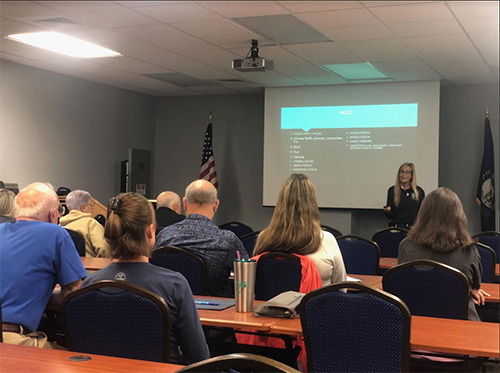Addison Watson
Contributing Writer
awatson25@murraystate.edu
The City of Murray Police Department held Night Two of the Citizens Police Academy on Oct. 14 to discuss telecommunications.
Jill Hudson has been answering 911 calls with the Murray Police Department for over 10 years. For the third time in her career, she presented to the Citizens Police Academy, giving insight into the depth her job entails.
Hudson’s ex-husband was a firefighter with the Murray-Calloway County Fire Department.
Hudson said understanding and living life with a first responder is what ultimately led her to apply for an opening for her position in 2008.
Being commonly known as a dispatcher in her career field, she said technically she is not a dispatcher, she is a telecommunicator. Dispatchers are radio transmission operators for bus companies, taxi services, trucking companies, and similar services. Telecommunicators are radio transmission operators who communicate among a variety of different lines to effectively organize communication.
Like police officers, telecommunicators attend the Department of Criminal Justice Training in Richmond, Kentucky. Their academy is five weeks long with a probation period when they return to their respective departments.
Unknown to many people, the police department answers all 911 calls, not just those who need police assistance. It is up to a telecommunicator’s discretion to pass the information received to the appropriate department.
Hudson provided a scenario in which an accident with an injury had occurred and as a result of the accident, a telephone pole had been struck and knocked over. The process of calling an ambulance and a fire truck is much more complicated than it seems.
Hudson said in order for an emergency 911 call to go smoothly, she has to prioritize the way she plans her callouts.
First, she would need to call an ambulance to the scene in the event that someone is seriously injured. Second, she would call the fire department out to extricate anyone from the vehicle if needed. She would then need to call the police department to establish traffic control as well as call the utility company to tend to the telephone pole.
All while doing those things, she has to remember which fire station is closest to the accident, which electric company covers the pole that was knocked down and a variety of other factors.
The system Hudson uses to answer calls for help can handle up to 23 incoming calls at once, but she often works alone. Having a system in place that is 100 percent digital makes her job more manageable. Murray upgraded its telecommunications system the year before she began. There are currently 6 telecommunicators working for the department.
In 2018, there were 22,660 calls for service that first responders tended to.
Hudson said she takes her job extremely seriously. It is not only a job to her; it is her calling.
“My number one priority is the safety of my officers, and when I say officers, I mean all my first responders,” Hudson said.
Sgt. Brant Shutt, the public information officer for Murray PD, said he respects his telecommunicators immensely, as the role they play in law enforcement is undeniably one of the most important.
“If I have an officer out there with a subject and he is trying to run them for warrants or gather some information on them, their eyes are no longer on the subject,” Shutt said. “So being able to call a telecommunicator and have them running the information for them, allows them to be aware of their surroundings instead of their face being in a computer screen.”
Sgt. Jay Herndon, sergeant of the overnight shift, is in charge of three or four other officers at any given time during the night. When it’s dark out, situational awareness automatically should be heightened and when an officer is trying to look up information on their own, they have a handicap over them.
“I want my officers to pay attention to what’s around them at all times,” Herndon said. “They need to have their heads on a swivel because anything can happen at any time.”
Not everyone who dials 911 can be the most cooperative. When emotions are at an all-time high, sometimes the most that Hudson can understand from a caller is their location, and that’s all she can use to make her decision.
Stressful situations come often in Hudson’s line of work. Coping with the stress and chaos of her job can be difficult, but Hudson has found ways to help.
She said sometimes she thinks about hanging up her phone and going home, but she knows in her mind why she loves her job.
“It’s the ones you know you’ve helped, that make it worth it,” Hudson said.
The next topic of discussion will be narcotics investigations.
Addison Watson is a contributing writer for The Murray State News. As part of his assignment, he is attending the Citizens Police Academy at the Murray Police Department to write this series of stories. You can find all of his articles in the series at TheNews.org.




























































































